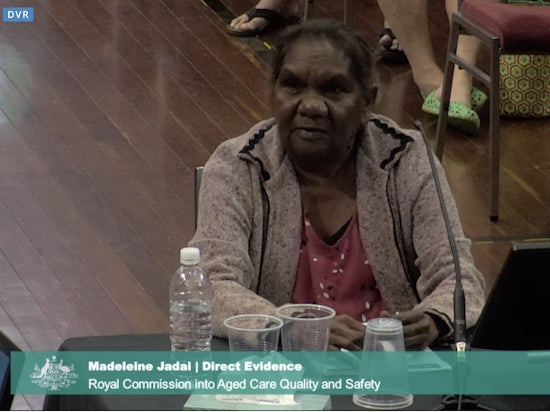Royal Commission returns to focus on aged care in remote areas and Indigenous Australians
The fourth series of hearings for the Royal Commission into Aged Care Quality and Safety has resumed in Broome, Western Australia with a focus on aged care in remote areas, the unique care needs of Indigenous Australians and the issues of access and inclusion.

Madeleine Jadai took to the stand to share her experience as a carer to her 62-year-old sister Betty who is living with dementia
People who identify as Aboriginal and Torres Strait Islander make up 16 percent of the remote population and 46 percent of the very remote population and the first day of the hearings demonstrated the importance of connection to country to these communities in the aged care setting.
Community Care Supervisor at Bidyadanga Community Care Centre, Faye Dean says there needs to be a greater understanding of the differences between Indigenous and mainstream cultures to ensure appropriate care is provided.
Through her experience supporting ageing Indigenous Australians, Ms Faye says there needs to be more of an understanding in the community about dementia, permanent positions for the aged care workforce and more respite opportunities.
“We need to understand that our elders are our future, are our culture and that’s who we learn off.”
Madeleine Jadai took to the stand to share her experience as a carer to her 62-year-old sister Betty who is living with dementia.
Ms Jadai has been caring for Betty since their mother passed away, but after losing her other sister in a car accident, she is also responsible for her sister’s children and a grandchild, as well as her own kids.
Betty attends the Home and Community Centre (HACC) in Bidyadanga almost every day where she is fed and enjoys social outings with her fellow community members.
However, Ms Jadai is calling on more respite services in remote areas to allow carers like herself the chance to have a break.
“Being a carer takes up all my time,” she explains.
“Looking after so many people means I am really tired all the time.
“There are other things I would like to do but I can’t because of my caring responsibilities.”
She also says there needs to be more dementia education in Indigenous communities and a greater understanding of cultural needs when it comes to the provision of aged care services.
At present, Ms Jadai is working on establishing an Elders Cultural Centre in Bidyadanga to ensure older Indigenous Australians remain connected to country as they age, an important part of community culture and wellbeing.
“We want to create something that older people, especially our elders, can take with them so they can maintain a connection to country,” she says.
“We also want to make something that helps younger people in our community stay attached to our history.
“I really wanted to tell my story because we live out in the remote and [people] don’t know what we go through.”
Yvonne Grosser, works as an enrolled nurse and says as an Aboriginal person herself, connection to country is so important.
She says serving cultural food a few nights a week, instead of ‘westernised food’ would provide a sense of belonging to the Indigenous residents.
Ms Grosser also says cultural awareness needs to be implemented within the aged care workforce.
“They need to be taught Aboriginal people are different.”
Professor of Geriatric Medicine at the University of Western Australia, Professor Leon Flicker says disability and age-related illness is more prevalent in Aboriginal and Torres Strait Islander people.
“We have evidence that the onset of the ageing related syndromes occur at a much younger age than in non-Aboriginal people – at least 10 years earlier and possibly longer.”
He says regardless of where care is coming from, it must be culturally appropriate for Indigenous communities
“Whether that’s provided by the NDIS or provided by aged care services is relatively a secondary consideration.
“Culturally safe and appropriate services are one of the major reasons why they prefer community care as opposed to residential care.”
Professor Flicker also says there is a need for cultural safety training among the aged care and disability care workforce.
Considerations in aged care provision of Indigenous Australians including language, cultural food and activities and cultural traditions regarding death, as well as financial pressures faced by service providers in remote areas are expected to be discussed in the Royal Commission this week.
Hearings will continue tomorrow at 9.20am AWST.










